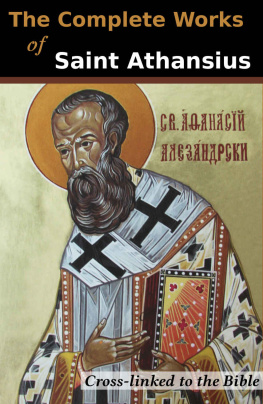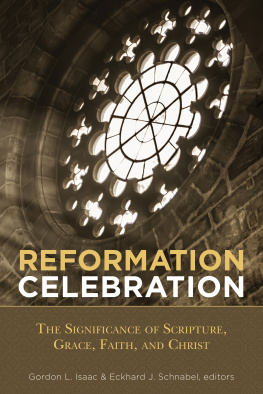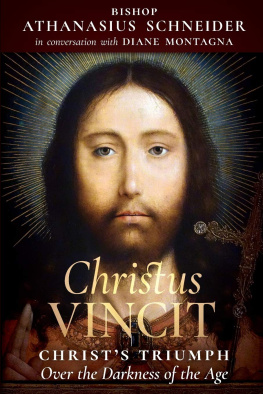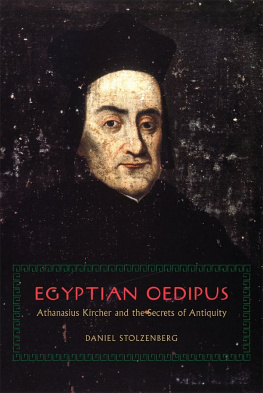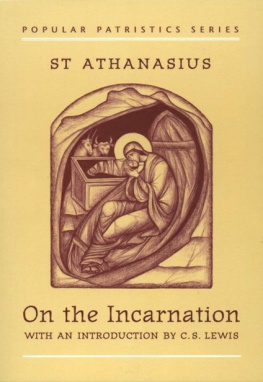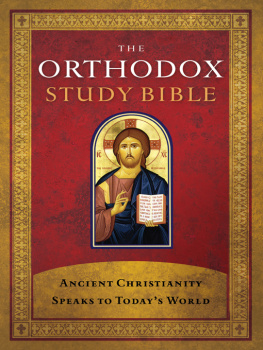The Complete Works of St. Athanasius

This material is available in the public domain.
Published from Toronto, Ontario
Canada
March, 2016
TABLE OF CONTENTS
Introduction
Athanasius was born in Egypt to a Christian family sometime around 295 AD.He was given a good education by his parents, and in his youth, the local bishop, recognizinghis talents, took him on as his aide. As a result he would get the chanceto be present at Nicaea for the first ecumenical council of the church.
Later Athanasius would become the bishop of the city of Alexandria, the leading city inEgypt. In this position, he would become probably the single mostimportant defender of the Christian church against the Arian heresy, which stated that Jesus was created by the father. The Nicene creed, which he helped formulate and defend, is still used as the basic statement of faithfor almost all Christian churches to this day.
These works cover the full span of his life, beginning before 319 AD, when he wrote his famous, 'On the Incarnation of the Word'. At the time there were a number of different understandings of Christ circulating throughout Egypt, and Christianity was not yet a well-defined, official religion of the Roman Empire. Most of his works center around defending the Christianfaith. Also included are many of his letters and the 'Life of St. Anthony', which became the defining work of earlymonasticism.
Against the Heathen
Introduction: The purpose of the book a vindication of Christian doctrine, and especially of the Cross, against the scoffing objection of Gentiles. The effects of this doctrine its main vindication.
Part 1
1. The knowledge of our religion and of the truth of things is independently manifest rather than in need of human teachers, for almost day by day it asserts itself by facts, and manifests itself brighter than the sun by the doctrine of Christ. 2. Still, as you nevertheless desire to hear about it, Macarius , come let us as we may be able set forth a few points of the faith of Christ: able though you are to find it out from the divine oracles, but yet generously desiring to hear from others as well. 3. For although the sacred and inspired Scriptures are sufficient to declare the truthwhile there are other works of our blessed teachers compiled for this purpose, if he meet with which a man will gain some knowledge of the interpretation of the Scriptures, and be able to learn what he wishes to knowstill, as we have not at present in our hands the compositions of our teachers, we must communicate in writing to you what we learned from themthe faith, namely, of Christ the Saviour; lest any should hold cheap the doctrine taught among us, or think faith. in Christ unreasonable. For this is what the Gentiles traduce and scoff at, and laugh loudly at us, insisting on the one fact of the Cross of Christ; and it is just here that one must pity their want of sense, because when they traduce the Cross of Christ they do not see that its power has filled all the world, and that by it the effects of the knowledge of God are made manifest to all. 4. For they would not have scoffed at such a fact, had they, too, been men who genuinely gave heed to His divine Nature. On the contrary, they in their turn would have recognised this man as Saviour of the world, and that the Cross has been not a disaster, but a healing of Creation. 5. For if after the Cross all idolatry was overthrown, while every manifestation of demons is driven away by this Sign , and Christ alone is worshipped and the Father known through Him, and, while gainsayers are put to shame, He daily invisibly wins over the souls of these gainsayers how, one might fairly ask them, is it still open to us to regard the matter as human, instead of confessing that He Who ascended the Cross is Word of God and Saviour of the World? But these men seem to me quite as bad as one who should traduce the sun when covered by clouds, while yet wondering at his light, seeing how the whole of creation is illumined by him. 6. For as the light is noble, and the sun, the chief cause of light, is nobler still, so, as it is a divine thing for the whole world to be filled with his knowledge, it follows that the orderer and chief cause of such an achievement is God and the Word of God. 7. We speak then as lies within our power, first refuting the ignorance of the unbelieving; so that what is false being refuted, the truth may then shine forth of itself, and that you yourself, friend, may be reassured that you have believed what is true, and in coming to know Christ have not been deceived. Moreover, I think it becoming to discourse to you, as a lover of Christ, about Christ, since I am sure that you rate faith in and knowledge of Him above anything else whatsoever.
2. Evil no part of the essential nature of things. The original creation and constitution of man in grace and in the knowledge of God.
In the beginning wickedness did not exist. Nor indeed does it exist even now in those who are holy, nor does it in any way belong to their nature. But men later on began to contrive it and to elaborate it to their own hurt. Whence also they devised the invention of idols, treating what was not as though it were. 2. For God Maker of all and King of all, that has His Being beyond all substance and human discovery, inasmuch as He is good and exceeding noble, made, through His own Word our Saviour Jesus Christ, the human race after His own image, and constituted man able to see and know realities by means of this assimilation to Himself, giving him also a conception and knowledge even of His own eternity, in order that, preserving his nature intact, he might not ever either depart from his idea of God, nor recoil from the communion of the holy ones; but having the grace of Him that gave it, having also God's own power from the Word of the Father, he might rejoice and have fellowship with the Deity, living the life of immortality unharmed and truly blessed. For having nothing to hinder his knowledge of the Deity, he ever beholds, by his purity, the Image of the Father, God the Word, after Whose image he himself is made. He is awe-struck as he contemplates that Providence which through the Word extends to the universe, being raised above the things of sense and every bodily appearance, but cleaving to the divine and thought-perceived things in the heavens by the power of his mind. 3. For when the mind of men does not hold converse with bodies, nor has mingled with it from without anything of their lust, but is wholly above them, dwelling with itself as it was made to begin with, then, transcending the things of sense and all things human, it is raised up on high; and seeing the Word, it sees in Him also the Father of the Word, taking pleasure in contemplating Him, and gaining renewal by its desire toward Him; 4. exactly as the first of men created, the one who was named Adam in Hebrew, is described in the Holy Scriptures as having at the beginning had his mind to God-ward in a freedom unembarrassed by shame, and as associating with the holy ones in that contemplation of things perceived by the mind which he enjoyed in the place where he was the place which the holy Moses called in figure a Garden. So purity of soul is sufficient of itself to reflect God, as the Lord also says, Blessed are the pure in heart, for they shall see God.
3. The decline of man from the above condition, owing to his absorption in material things.
Thus then, as we have said, the Creator fashioned the race of men, and thus meant it to remain. But men, making light of better things, and holding back from apprehending them, began to seek in preference things nearer to themselves. 2. But nearer to themselves were the body and its senses; so that while removing their mind from the things perceived by thought, they began to regard themselves; and so doing, and holding to the body and the other things of sense, and deceived as it were in their own surroundings, they fell into lust of themselves, preferring what was their own to the contemplation of what belonged to God. Having then made themselves at home in these things, and not being willing to leave what was so near to them, they entangled their soul with bodily pleasures, vexed and turbid with all kind of lusts, while they wholly forgot the power they originally had from God. 3. But the truth of this one may see from the man who was first made, according to what the holy Scriptures tell us of him. For he also, as long as he kept his mind to God, and the contemplation of God, turned away from the contemplation of the body. But when, by counsel of the serpent, he departed from the consideration of God, and began to regard himself, then they not only fell to bodily lust, but knew that they were naked, and knowing, were ashamed. But they knew that they were naked, not so much of clothing as that they had become stripped of the contemplation of divine things, and had transferred their understanding to the contraries. For having departed from the consideration of the one and the true, namely, God, and from desire of Him, they had thenceforward embarked in various lusts and in those of the several bodily senses. 4. Next, as is apt to happen, having formed a desire for each and sundry, they began to be habituated to these desires, so that they were even afraid to leave them: whence the soul became subject to cowardice and alarms, and pleasures and thoughts of mortality. For not being willing to leave her lusts, she fears death and her separation from the body. But again, from lusting, and not meeting with gratification, she learned to commit murder and wrong. We are then led naturally to show, as best we can, how she does this.

